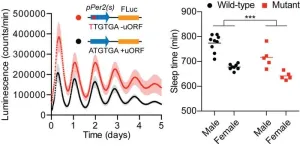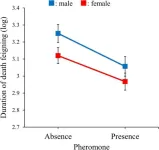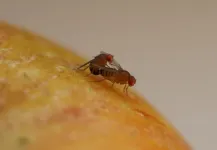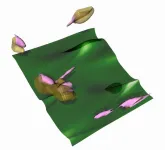(Press-News.org) The research teams of Professor René Ketting at the Institute of Molecular Biology (IMB) in Mainz, Germany, and Dr. Sebastian Falk at the Max Perutz Labs in Vienna, Austria, have identified a new enzyme called PUCH, which plays a key role in preventing the spread of parasitic DNA in our genomes. These findings may reveal new insights into how our bodies detect and fight bacteria and viruses to prevent infections.
Our cells are under constant attack from millions of foreign intruders, such as viruses and bacteria. To keep us from getting sick, our bodies have an immune system – a whole army of cells that specializes in detecting and destroying these invaders. However, our cells face threats not only from external enemies but also from within.
Genomic parasites populate a large part of the genome
An amazing 45 percent of our genome is comprised of thousands of genomic parasites, i.e., repetitive DNA sequences called transposable elements (TEs). TEs are found in all organisms but have no specific function. They can, however, be dangerous. TEs are also called "jumping genes" because they can copy and paste themselves into new locations in our DNA. This is a major problem because it can lead to mutations that cause ouer cells to stop working normally or to become cancerous. As such, almost half of our genome is engaged in a constant guerrilla war with the other half as TEs seek to multiply, while our cells try to prevent them from spreading.
How do our cells combat these internal enemies? Fortunately, our cells have evolved a genomic defense system of specialized proteins whose job it is to hunt down TEs and prevent them from replicating. In a new paper published in Nature, René Ketting and Sebastian Falk together with their research teams report their discovery of PUCH – a completely new, previously unknown type of enzyme, which is key to this genomic defense system. They found that PUCH plays a crucial role in producing small molecules called piRNAs, which detect TEs when they attempt to "jump". They then activate the genomic defense system to stop TEs before they paste themselves into new locations in our DNA.
The researchers discovered PUCH in the cells of the roundworm C. elegans, a simple invertebrate often used in biological research. However, the findings may also shed light on how our own immune system works. PUCH is characterized by unique molecular structures called Schlafen folds. Enzymes with Schlafen folds are also found in mice and humans, where they appear to play a role in innate immunity, the body's first line of defense against viruses and bacteria. For example, some Schlafen proteins interfere with the replication of viruses in humans. On the other hand, some viruses such as monkeypox viruses, for example, may also use Schlafen proteins to attack the cell's defense system. René Ketting suspects that Schlafen proteins may have a wider, conserved role in immunity in many species, including humans.
"Schlafen proteins may represent a previously unknown molecular link between immune responses in mammals and deeply conserved RNA-based mechanisms that control TEs," said Ketting, who is also a Professor of Biology at Johannes Gutenberg University Mainz (JGU). If so, Schlafen proteins may represent a common defense mechanism against both external enemies like viruses and bacteria as well as internal ones such as TEs. "It's conceivable that Schlafen proteins have been repurposed into enzymes that protect cells from infectious DNA sequences, such as TEs," added Sebastian Falk. "This discovery may profoundly impact our understanding of innate immune biology."
About the Institute of Molecular Biology gGmbH
The Institute of Molecular Biology gGmbH (IMB) is a center of excellence in the life sciences established in 2011 on the campus of Johannes Gutenberg University Mainz. Research at IMB focuses on the cutting-edge fields of epigenetics, genome stability, ageing, and RNA biology. The IMB is a prime example of successful collaboration between a private foundation and the state government: The Boehringer Ingelheim Foundation has committed EUR 154 million to be disbursed from 2009 until 2027 to cover the operating costs of research at IMB. The state of Rhineland-Palatinate has provided approximately EUR 50 million for the construction of a state-of-the-art building and is giving a further EUR 52 million in core funding from 2020 until 2027. For more information about IMB, please visit: www.imb.de
Related links:
https://www.imb.de/ - Institute of Molecular Biology (IMB)
https://www.imb.de/research/ketting/research - Biology of Non-Coding RNA group of René Ketting
https://www.maxperutzlabs.ac.at/research/research-groups/falk - Biogenesis & Action of small RNAs group of Sebastian Falk at the Max Perutz Labs Vienna END
Defense against the enemy within
Scientists discover a new enzyme that helps cells fight genomic parasites
2023-10-02
ELSE PRESS RELEASES FROM THIS DATE:
New tool reveals how drugs affect men, women differently -- and will make for safer medications
2023-10-02
UVA Health researchers have developed a powerful new tool to understand how medications affect men and women differently, and that will help lead to safer, more effective drugs in the future.
Women are known to suffer a disproportionate number of liver problems from medications. At the same time, they are typically underrepresented in drug testing. To address this, the UVA scientists have developed sophisticated computer simulations of male and female livers and used them to reveal sex-specific differences in how the tissues are affected by drugs.
The new model has already provided ...
Researchers develop mixture of compounds to help preserve organs before transplantation
2023-10-02
Using zebrafish as a model, investigators have determined a suitable combination of chemical compounds in which to store hearts, and potentially other organs, when frozen for extended periods of time before transplantation.
The work, which is published in The FASEB Journal, involved a variety of methods, including assays at multiple developmental stages, techniques for loading and unloading agents, and the use of viability scores to quantify organ function.
These methods allowed scientists to perform the largest and most comprehensive screen of cryoprotectant agents to determine their toxicity and efficiency at preserving ...
A surprising way to disrupt sleep
2023-10-02
Osaka, Japan - Circadian rhythms, the internal biological clocks that regulate our daily activities, are essential for maintaining health and well-being. While the role of transcription in these rhythms is well-established, a new study sheds light on the critical importance of post-transcriptional processes. The research, titled “Circadian ribosome profiling reveals a role for the Period2 upstream open reading frame in sleep,” to be published in PNAS, redefines our understanding of how translation and post-transcriptional processes influence the body’s internal clock and its impact on sleep patterns.
Timing Is Everything: ...
To Eat or Not to Eat: Targeting autophagy to enhance memory immune responses
2023-10-02
Osaka, Japan – Memory B cells depend on autophagy for their survival, but the protein Rubicon is thought to hinder this process. Researchers from Osaka University have discovered a shorter isoform of Rubicon called RUBCN100, which enhances autophagy in B cells. Mice that lacked the longer isoform, RUBCN130, produced more memory B cells in a way that relied on autophagy. These findings provide further insight into the role of Rubicon in autophagy.
Autophagy is a mechanism that degrades and ...
Researchers find a cause of Parkinson’s disease
2023-10-02
Until recently, our understanding of Parkinson's disease has been quite limited, which has been apparent in the limited treatment options and management of this debilitating condition.
Our recent understanding has primarily revolved around the genetic factors responsible for familial cases, while the causative factors in the vast majority of patients remained unknown.
However, in a new study, researchers from the University of Copenhagen have unveiled new insights into the workings of the brain in Parkinson's patients. Leading the groundbreaking discovery is Professor Shohreh Issazadeh-Navikas.
“For the first time, we can show that mitochondria, ...
Pheromones influence death feigning behavior in beetles
2023-10-02
Predation is a driving force in the evolution of anti-predator strategies, and death feigning, characterized by immobility in response to threats, is a common defensive mechanism across various animal species. While this behavior can enhance an individual's survival prospects by reducing a predator's interest, it also carries costs, such as limited opportunities for feeding and reproduction. Recently, researchers from Okayama University, Japan, investigated how pheromones, important chemical signals that affect foraging and reproduction, might influence death-feigning behavior in the red flour beetle, Tribolium castaneum.
“Male beetles release an aggregation pheromone called ...
Genetics of attraction: mate choice in fruit flies
2023-10-02
Genetic quality or genetic compatibility? What do female fruit flies prioritize when mating? Researchers at the University of Zurich show that both factors are important at different stages of the reproductive process and that females use targeted strategies to optimize the fitness of their offspring.
Breeding female fruit flies face a difficult decision: do they mate with the male that has the best genes, or with the one whose genes best match their own? Evolutionary biologists from the University of Zurich and Concordia University have now investigated ...
FAU Engineering study employs deep learning to explain extreme events
2023-10-02
Identifying the underlying cause of extreme events such as floods, heavy downpours or tornados is immensely difficult and can take a concerted effort by scientists over several decades to arrive at feasible physical explanations.
Extreme events cause significant deviation from expected behavior and can dictate the overall outcome for a number of scientific problems and practical situations. For example, practical scenarios where a fundamental understanding of extreme events can be of vital importance include rogue waves in the ocean that could endanger ships and offshore structures or increasingly ...
New study uncovers potential treatment for non-alcoholic fatty liver disease
2023-10-02
A breakthrough study, jointly led by Professor Jang Hyun Choi and Professor Sung Ho Park from the Department of Biological Sciences at UNIST has identified an important factor involved in the development of non-alcoholic fatty liver disease (NAFLD) caused by obesity. The research team discovered that Thrap3, a protein associated with thyroid hormone receptors, plays a significant role in exacerbating NAFLD by inhibiting the activity of adenosine monophosphate-activated protein kinase (AMPK), a key regulator of fat metabolism in the liver.
NAFLD encompasses various metabolic diseases such as fatty hepatitis and cirrhosis resulting from excessive fat accumulation. ...
Susan G. Komen® analysis shows many breast cancer patients struggle to afford basic needs: Housing, transportation, utilities
2023-10-02
Lower income breast cancer patients often struggle to afford life’s necessities such as housing, transportation and utilities due to direct and incidental costs related to their treatment, according to a new analysis by Susan G. Komen®, the world’s leading breast cancer organization. These top needs were identified by Susan G. Komen’s Patient Care Center, which provided nearly $9.1 million in grants to more than 16,000 breast cancer patients from April 1, 2022 to March 31, 2023, as part of Komen’s direct-to-patient ...
LAST 30 PRESS RELEASES:
Cal Poly’s fifth Climate Solutions Now conference to take place Feb. 23-27
Mask-wearing during COVID-19 linked to reduced air pollution–triggered heart attack risk in Japan
Achieving cross-coupling reactions of fatty amide reduction radicals via iridium-photorelay catalysis and other strategies
Shorter may be sweeter: Study finds 15-second health ads can curb junk food cravings
Family relationships identified in Stone Age graves on Gotland
Effectiveness of exercise to ease osteoarthritis symptoms likely minimal and transient
Cost of copper must rise double to meet basic copper needs
A gel for wounds that won’t heal
Iron, carbon, and the art of toxic cleanup
Organic soil amendments work together to help sandy soils hold water longer, study finds
Hidden carbon in mangrove soils may play a larger role in climate regulation than previously thought
Weight-loss wonder pills prompt scrutiny of key ingredient
Nonprofit leader Diane Dodge to receive 2026 Penn Nursing Renfield Foundation Award for Global Women’s Health
Maternal smoking during pregnancy may be linked to higher blood pressure in children, NIH study finds
New Lund model aims to shorten the path to life-saving cell and gene therapies
Researchers create ultra-stretchable, liquid-repellent materials via laser ablation
Combining AI with OCT shows potential for detecting lipid-rich plaques in coronary arteries
SeaCast revolutionizes Mediterranean Sea forecasting with AI-powered speed and accuracy
JMIR Publications’ JMIR Bioinformatics and Biotechnology invites submissions on Bridging Data, AI, and Innovation to Transform Health
Honey bees navigate more precisely than previously thought
Air pollution may directly contribute to Alzheimer’s disease
Study finds early imaging after pediatric UTIs may do more harm than good
UC San Diego Health joins national research for maternal-fetal care
New biomarker predicts chemotherapy response in triple-negative breast cancer
Treatment algorithms featured in Brain Trauma Foundation’s update of guidelines for care of patients with penetrating traumatic brain injury
Over 40% of musicians experience tinnitus; hearing loss and hyperacusis also significantly elevated
Artificial intelligence predicts colorectal cancer risk in ulcerative colitis patients
Mayo Clinic installs first magnetic nanoparticle hyperthermia system for cancer research in the US
Calibr-Skaggs and Kainomyx launch collaboration to pioneer novel malaria treatments
JAX-NYSCF Collaborative and GSK announce collaboration to advance translational models for neurodegenerative disease research
[Press-News.org] Defense against the enemy withinScientists discover a new enzyme that helps cells fight genomic parasites






